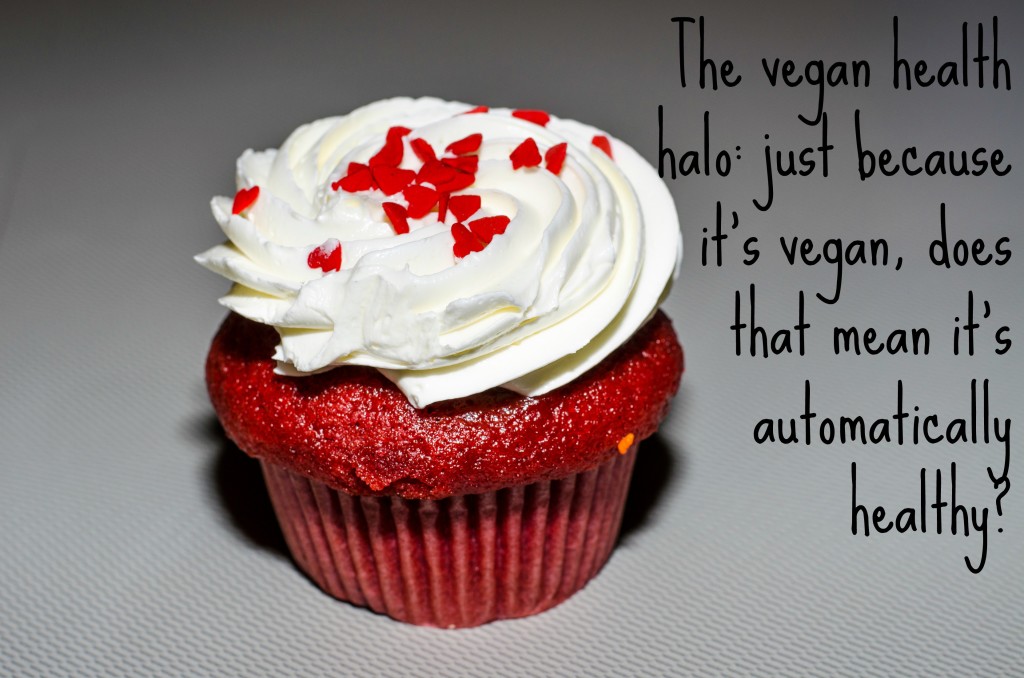Since I have decided to eat a vegan diet for the month of September (the reasons for which can be found at Living Healthy in the Real World), I have received a lot of congratulations.
Good for you.
That’s really impressive.
I could never do that.
A friend of mine—who is supportive of my vegan nutrition challenge—brought up an interesting point about all of these phrases. Her perspective was that eating vegan is not very healthy. She didn’t understand why people should be so in awe by it, or what the big deal is. She is frustrated that the general consensus, when people start eliminating meat or meat products from their diet, is one of admiration.
Now, she is by no means a huge meat-eater herself. She enjoys animal products but eats mostly vegetarian. Her real frustration, and mine as well, is the health halo that hangs over the term vegan.
When it comes to the above congratulatory remarks that have been said to me, I know that people are using these terms because of the reason for my veganism (which is to spread awareness about animal ingredients and derivatives in food products), rather than because they necessarily believe that veganism is healthy. But oftentimes when people congratulate others for going vegan, it is because of the bright shiny vegan health halo.
The vegan health halo at work
The “health halo” is when we believe that something is healthier than it actually is; we are blinded by certain nutrition claims or marketing strategies. An article in The New York Times describes how consumers believe that if a box of crackers has a “trans fat free” label on it, they assume it means that the crackers are low in calories, low in fat, or healthy in general. Similarly, when consumers buy a “healthy” sandwich (“no mayo, no cheese, whole wheat bread!”), they tend to reward themselves with buying a cookie for dessert.
This kind of justification is an illusion of good health. The consumer thinks that if they are eating one thing healthy, and if they buy the cookie from a restaurant with a reputation for having healthier foods, then they have done something good for their health. They forget that it’s still a cookie. They forget that the sandwich uses such thick bread that it’s actually equal to four servings of grains. They forget that there could be all kinds of unhealthy ingredients, such as high fructose corn syrup, in that restaurant’s bread.
It’s the same way with the vegan health halo. As the blog post How can vegans be overweight? points out, we have an optimistic bias that leads us to the conclusion that veganism must be healthy. There are, however, a lot of things to take into consideration when adopting a vegan diet. It is very easy to miss out on consuming essential nutrients, and it is equally easy to chow down on processed junk.
Nutrition and the vegan diet
Important nutrients that vegans might be lacking are protein, vitamin B12, vitamin D, and iron. There is a very good reason that we eat meat and animal products: they are packed full of nutrients! When we avoid them altogether, we really need to pay a lot of attention to what we eat so that we don’t become deficient in anything. Most of the time vegans end up requiring a daily supplement to ensure that they are consuming all of the right nutrients, but supplementation is something that we should all be wary of: a supplement does not give us leeway to eat unhealthy, and it could even lead to overdosing on some nutrients so that we reach toxic levels of them. It is rare for someone to reach toxic levels of a nutrient simply from their diet; most of the time if they have reached toxicity levels, it is because of their multivitamin.
The other problem is that a lot of processed foods are now vegan. There are veganized versions of chips and cookies and crackers and hot dogs. Most kinds of non-dairy milks have lengthy ingredient lists, including several kinds of sugar. Bakeries offer many vegan choices for cookies and muffins. Just because it doesn’t contain eggs or butter, doesn’t mean that the food is devoid of sugar or fats! Tofu, while a good source of protein and versatile enough to add to just about anything, can also be highly processed.
These are all things to remember when anyone begins to eliminate a food group: Why are we impressed by it? What do we mean when we say “good for you”? What kind of lens are we viewing these diets in?
It’s easy to start talking and throwing in our $0.02. Understanding what the heck we mean when we open our mouths is something else entirely.
